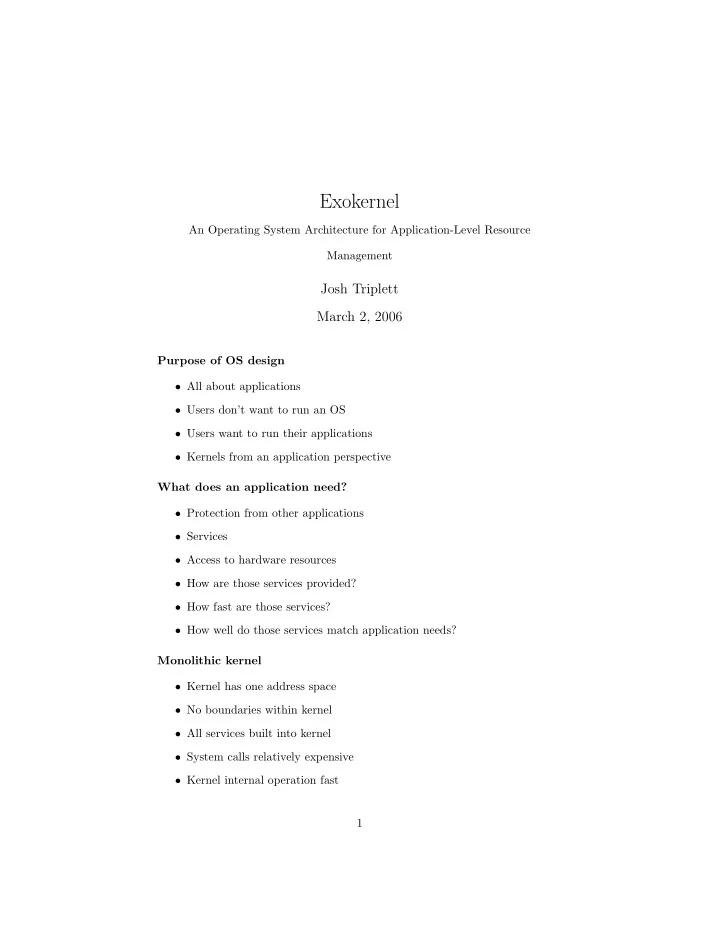

Exokernel An Operating System Architecture for Application-Level Resource Management Josh Triplett March 2, 2006 Purpose of OS design • All about applications • Users don’t want to run an OS • Users want to run their applications • Kernels from an application perspective What does an application need? • Protection from other applications • Services • Access to hardware resources • How are those services provided? • How fast are those services? • How well do those services match application needs? Monolithic kernel • Kernel has one address space • No boundaries within kernel • All services built into kernel • System calls relatively expensive • Kernel internal operation fast 1
• One-size-fits-all services • Abstractions impair efficiency • Especially if not the right abstractions Microkernel • “minimal” kernel • Simpler, lower-level abstractions over hardware • Processes and timesharing • Address spaces, paging and virtual memory • Inter-process communication (IPC) • Additional services provided via IPC • Good protection, isolation • Customizable Microkernel problems • Extensive IPC impacts performance • More generally, abstractions still impair efficiency • “Minimal abstraction” is an oxymoron • Still providing some one-size-fits-all services • Concept good: move services out of kernel • Could we go further? Exokernel • Secure hardware multiplexer • Expose details of hardware resources • Validate access • Everything else provided by “Library operating systems” 2
Expose resource allocation and naming • Library OS requests specific physical resources • Physical pages, disk blocks, time slices, etc • Expose physical resource names/numbers • No implicit allocation • Mechanism, not policy • Library OSes can implement various policies Expose resource revocation • Exokernel needs a unit of a resource • Example: memory page • Exokernel asks a library OS • “Free a page” • Library OS chooses what to free • Exokernel sets time limits • Time’s up: forcibly revoke, notify Hardware to multiplex • CPU • Interrupts • Memory • Direct Memory Access (DMA) • Disk • Network • Control transfer 3
CPU • Resource: linear vector of CPU time • Mechanism: safely expose timer interrupts • Partitions time into time slices • Library OS reserves specific time slices in advance • Various scheduling policies • Long, infrequent slices for throughput • Short, frequent slices for responsiveness • Context saving and switching implemented by library OS • Like scheduler activations, but more efficient Physical memory • Resource: Linear physical memory • Mechanism: Safely expose TLB and/or page table • Library OSes request pages • Exokernel validates access • Library OS controls protection, sharing • Library OS handles caching, locality, etc • Exokernel provides safe DMA Network • Resource: incoming data stream • Mechanism: packet filter • Filters compiled into machine code by exokernel • Filters run safely in kernel 4
Protected control transfer • Client transfers control to server • Predefined server entry point • Client donates time slice • No other functionality • Highly optimized: 30 instructions • Library OSes implement context saving if desired • Can use to build IPC, RPC, pipes • Or not: just a control transfer Library operating systems • Build on top of exokernel hardware interfaces • Provide functionality to applications • Functionality and policies specifically tuned to application needs • May provide full OS services • May provide minimal services, maximal performance • Application interface to library OS can be efficient • Exokernel invocation efficient: 18 instructions • Good platform for experimentation Exokernel summary • Problem: Abstractions are slow, not tuned to all applications • Solution: Just provide hardware multiplexing, nothing else • Expose physical resource allocation, naming, revocation • Support library operating systems • Mechanism, not policy • Highly efficient • Highly flexible 5
Recommend
More recommend